Hi, we’re John and Matt and, icymi, we are watching every single live-action film starring Streep...
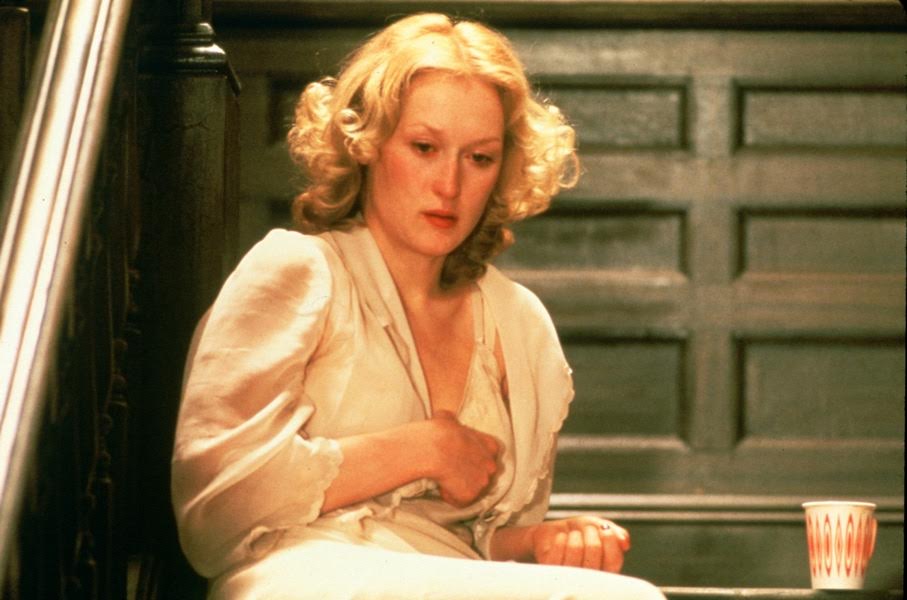
#8 — Sophie Zawistowska, a Polish Holocaust survivor now fighting back personal demons as a Brooklyn émigré.
JOHN: Meryl Streep is as defined by Sophie’s Choice as Tiffany's is by diamonds. Her “choice” is perhaps the most notorious scene in Streep’s oeuvre, known by people who have no idea that The Deer Hunter or Silkwood or Ironweed even exist. In only our eighth entry, we have already arrived at the performance in which the legend of Streep was crystallized forever...
Sophie solidified Streep as an actress of tremendous linguistic faculties and overall technical prowess, a shapeshifter capable of evoking both mystery and lucidity, and as a trouper who works hard to disguise the faulty material she’s often caught up in. Let’s be frank: I love this woman and I sit in complete awe of most of this performance, but Sophie’s Choice remains a despicable, coarse, and downright exploitative film. The eroticization of Sophie, in which her unspeakable Holocaust trauma is framed as titillating fodder for Stingo's sexual maturity, is the definition of distasteful. As wrenching and as stupefying as Streep’s Sophie is, I’d like to release her from association with this albatross and pry, even just a bit, at the legendary status this performance has accrued, often at the cost of even greater Streep performances.
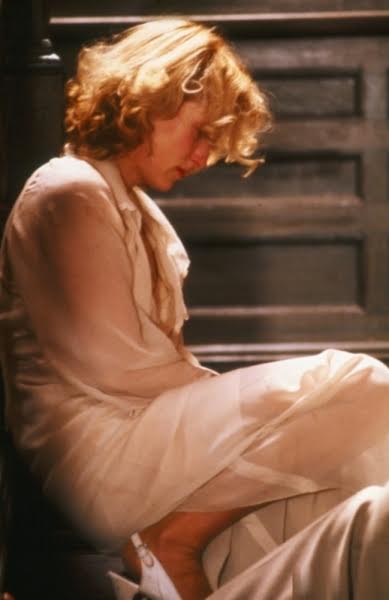 I’m reiterating sentiments that many have expressed more elegantly in the past, not only regarding the dire flaws in Sophie’s Choice, but in regards to the continual tension in Streep’s career between her prodigal talent and subpar material. In this instance, the gap between her virtuoso performance and her film’s distasteful narrative might be the widest gulf in Streep’s filmography. How can we separate the actress from the film? How do we understand the choices Streep makes as an actress as connected to or distinct from the choices made for her by the director, the screenwriter, the cinematographer, and so on? How can we bridge these gaps without selling short Streep’s genius? How do we begin to talk about Brooklyn’s own Sophie Zawistowska?
I’m reiterating sentiments that many have expressed more elegantly in the past, not only regarding the dire flaws in Sophie’s Choice, but in regards to the continual tension in Streep’s career between her prodigal talent and subpar material. In this instance, the gap between her virtuoso performance and her film’s distasteful narrative might be the widest gulf in Streep’s filmography. How can we separate the actress from the film? How do we understand the choices Streep makes as an actress as connected to or distinct from the choices made for her by the director, the screenwriter, the cinematographer, and so on? How can we bridge these gaps without selling short Streep’s genius? How do we begin to talk about Brooklyn’s own Sophie Zawistowska?
MATTHEW: I think you’ve done a pretty stellar job of summing up why Sophie’s Choice presents such a vexing personal conundrum for so many Streep devotees, myself included. The film, directed — quite shockingly — by Klute and All the President’s Men helmer Alan J. Pakula, is a disaster on levels both ethical and cinematic. It’s as if someone decided that what was really missing from Jules and Jim was an extended Holocaust subplot. And yet Sophie’s Choice currently holds a place above Goodfellas, Pulp Fiction, and Do the Right Thing on the American Film Institute’s most recent list of the 100 best American movies, a baffling honor that’s hard to imagine existing without Streep’s work, which was ballyhooed by the Academy and every major critics’ group upon its release. Her turn remains a Polaris for actresses of all generations, from Jane Fonda to Reese Witherspoon. Streep’s earnest, apologetic, and agonized Sophie is indeed a canon-worthy characterization, so much so that discussion about the performance can often lead to hazy, hyperbolic worship that is wholly removed from particulars and frequently forgiving of the film itself.
I’ve now seen Sophie’s Choice three times and what struck me on this latest rewatch is the sheer assuredness of Streep’s performance, which confounds from the beginning. We hear her before we even see her, screaming “Don’t go!” far off-camera. When we finally see her, she’s a pale, wispy, but beautiful figure in a nightgown and shawl being berated and shaken by her mercurial lover Nathan (Kevin Kline, overacting unendingly in his film debut), who eventually leaves a distraught Sophie on the staircase of their boarding house, where Peter MacNicol’s intolerably self-absorbed Southern writer Stingo has just moved in. He inquires about her well-being from the safety of his doorway, but Sophie only defends Nathan, offering heartfelt assurances given voice by Streep in that confoundingly precise but somehow fluid Polish accent. But what makes the scene most memorable and somehow poignant is how perceptibly difficult it is for Sophie to get up and move away. Every limb in Streep’s body looks like it has gone limp with anguish, providing firm counterproof to that infamous Pauline Kael potshot about being unable to “visualize [Streep] from the neck down.” Even in her first scene, Streep is physically telegraphing an enormous emotional weight that exists away from the confines of the page.
But as the performance progresses, particularly in its first-third, I found myself growing increasingly weary with the corners that Pakula, as director and writer, keeps backing Streep into in order to make light of Sophie’s naïveté, particularly when it comes to her broken English. There is something too overthought and coldly calculated about the way with which Streep shows us Sophie mispronouncing and forgetting her English words, heavily stammering over her diction and putting too much purpose in each lapse, thus allowing Sophie to indeed play the fool that Pakula envisions. These instances don’t put us into the unstable mind of a character so much as they put us on the page of a shoddy script and an actress struggling to make them plausible. They also give some credence to Kael’s arguably more sympathetic critique of what she considers a predetermined quality in Streep’s acting that disallows her characters from believably and fully existing in the everyday. This evaluation of Streep’s style has followed her throughout her entire career but particularly in Sophie’s Choice, in which she is never more gripping than in her near-silent moments, when Sophie’s equanimity is visibly and vividly cracked as ghosts from the past fog her memory and stunt her ability to communicate. I don’t think Kael’s argument holds, especially as Sophie’s Choice continues, revealing the horror lurking behind this self-consciously zany portrait of a makeshift ménage à trois. That isn’t to say that the film gets much better but it at least provides ample opportunities for Streep to create some legendary and truly transcendant moments of screen acting.
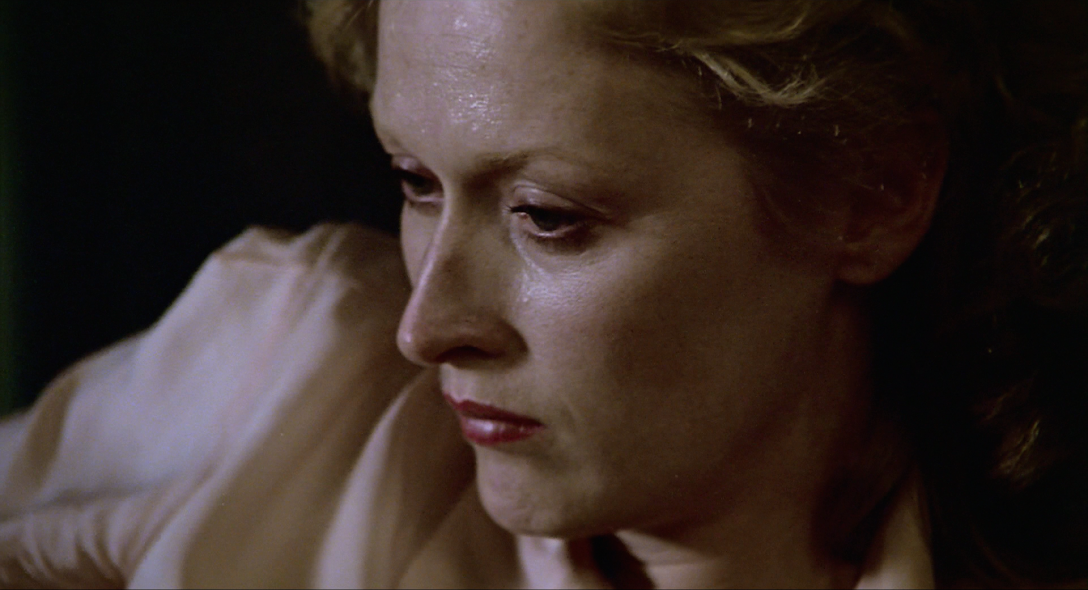
JOHN: Kael’s criticism of Streep is, I think, merely a matter of preference. Especially regarding Streep in Sophie’s Choice. Is the “problem” with Streep’s work here really an inability to free herself on screen, an unwillingness to unleash her libido and writhe with exciting danger and passion? Is this really a performance that requires a viewer to think about Streep’s body in the way Kael’s remark alludes to? Streep does a fine job of eroticizing Sophie in the present-day scenes, but how corporeal could one be in a concentration camp? In fact, one of the most chilling shots in the film remains the downward pan of Sophie, skeletal, shaved, uniformed, and walking forlornly in her cherished boots, as she’s led by a guard to her post at the commander’s house. Streep anticipates the imposing impression this image of her will create and shrinks herself accordingly in the frame while engaging her whole body. Every choice she makes throughout the Auschwitz passages is pitch-perfect, eliciting tremendous sympathy by scaling back her expressions as she steadily endures increasing torment. In the present-day scenes, where she’s asked to be a cryptic object of Stingo’s desire, Streep maybe uses her body too much, goading the men into confirming an idea of her as a mysterious, exciting puzzle.
But I’m done nitpicking. Even in rare moments where Streep gets caught entertaining unfair ideas about Sophie, I feel this is less the result of anything Streep decided herself, but instead the culmination of choices made behind the camera and thus beyond her control. While some of those dreadful Nathan and Stingo scenes fade from memory, I just can’t stop thinking about Sophie sitting on her windowsill, directly addressing the camera while confessing unspeakable horrors. Streep is completely transparent through the window, relating a memory with such clarity, and yet she is separated by the faintest trace of the window, slightly out of reach. When we meet Sophie at Brooklyn College, her body drained to the point of disintegration, Streep looks as though she could disappear right off the screen and evaporate into thin air, and yet she compels the viewer to confront and endure this agony with her, a feat that would have made Falconetti proud.
Maybe it’s too easy to praise Streep’s ability to drain, shrink, or ache on-screen. “Meryl Streep is perhaps the first actress since the young Ingrid Bergman to make desolation ravishingly sexy,” David Denby curiously remarked at the time, a critical stance that sells her work short. Sophie does more than endure misery throughout the film, even in the harrowing Auschwitz passages. Like Streep, Sophie must act to conceal her identity, learn new languages, surmount impossible odds, and quite simply perform to stay alive, making choices from moment to moment like an actress. As she begs the commander to relocate her son, Sophie gets on her knees and gambles on the flicker of humanity she spies in her proprietor's vulnerability, only to have her wish deflected. When her attempt to steal his daughter’s radio goes wrong, she plays the naive fool, faints, and treats the young Nazi girl as she would her own daughter.
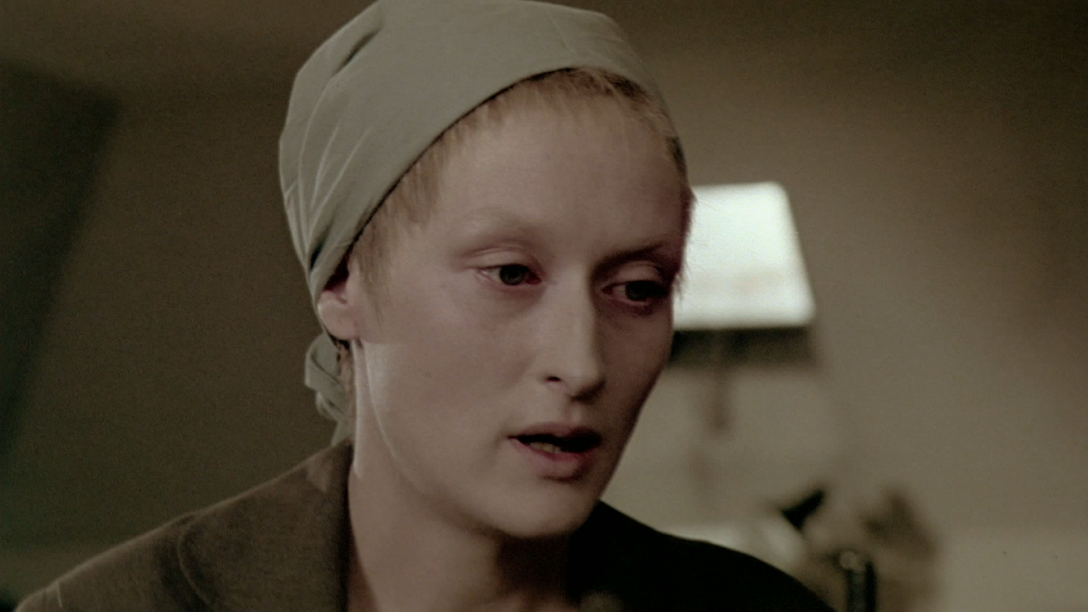
In her ambivalent take on Streep’s performance in Vogue, Molly Haskell grapples with the central conundrum of Streep’s expert virtuosity and Sophie’s passive victimhood, conceding that Streep’s chameleonic quality cancels out the flesh and blood of the performance:
Pakula's scrupulously faithful and richly atmospheric adaptation gives full rein to Streep's chameleon-like inventiveness in her most physical performance to date. She trips over ‘the English’ in her charmingly comical Polish accent, falls on the floor with anemia, blossoms under the solicitude of her mad lover Nathan. But in the end, her guilt defines her, and we know no more about her interior life than we did at the beginning. What was missing from the character to begin with is still missing: some core identity that Meryl Streep, a mistress of self-disguise who will never be accused of just ‘playing herself,’ can't supply… I found myself more intrigued by the actress than moved by the character, fascinated by Meryl's ‘choices’ rather than Sophie's Choice.”
I don’t necessarily need actors to “play themselves” in every role; there are Marlene Dietrichs and there are Julianne Moores, and I love each strand of actressing just the same. But I do agree with Haskell’s assessment that Streep’s performance ultimately outstrips Sophie the character.
Does Streep provide Sophie's core identity, her interior life? Is Sophie defined only by guilt? Do words suffice when discussing the titular choice?
MATTHEW: Haskell’s appraisal is thought-provoking though I don’t agree. I do actually believe that Streep wrangles a startlingly human creation out of the patriarchal clutches of this production. Nearly everyone involved in the film keeps trying to hold up Sophie as an angel, goddess, martyr, and saint, but Streep is the only one who ever brings her down to earth and manifests a woman who is thrummingly alive in both body and mind.
One of my absolute favorite moments in Streep’s performance is when Sophie lashes out at Stingo for callously diminishing her own frustration over Nathan’s monomaniacal Holocaust obsession, a crucial moment that signals that there are personal limits to how much Sophie is willing to stomach Nathan’s madness, which will ultimately be her downfall. Streep’s sharp-toned readings in that scene convey a very real, spur-of-the-moment anger that could have only emanated from an actress intensely and intuitively in tune with the woman she’s inhabiting, a woman with a variety of human emotions that are only ever unleashed by Streep, who breaks down the border that separates the disarming shiksa dreamgirl from the perpetually disturbed survivor. MacNicol, for his part, looks utterly cowed by this unexpected rebuttal and it’s the first authentic moment in a performance defined by affectations of innocence, which reminds us even though Streep is still working on an entirely different plane than her fellow actors, she still manages to empathically connect with them and, in this case, challenge them, vocally and physically. Even if Sophie had no lines in this scene, her annoyance would still be palpable through the iron-eyed, uncomprehending looks that surface on Streep’s face with disorienting suddenness. It’s as if Sophie herself cannot control the speed of her own vexed reactions, which uncover an irritability that we didn’t even know the character could conceive.
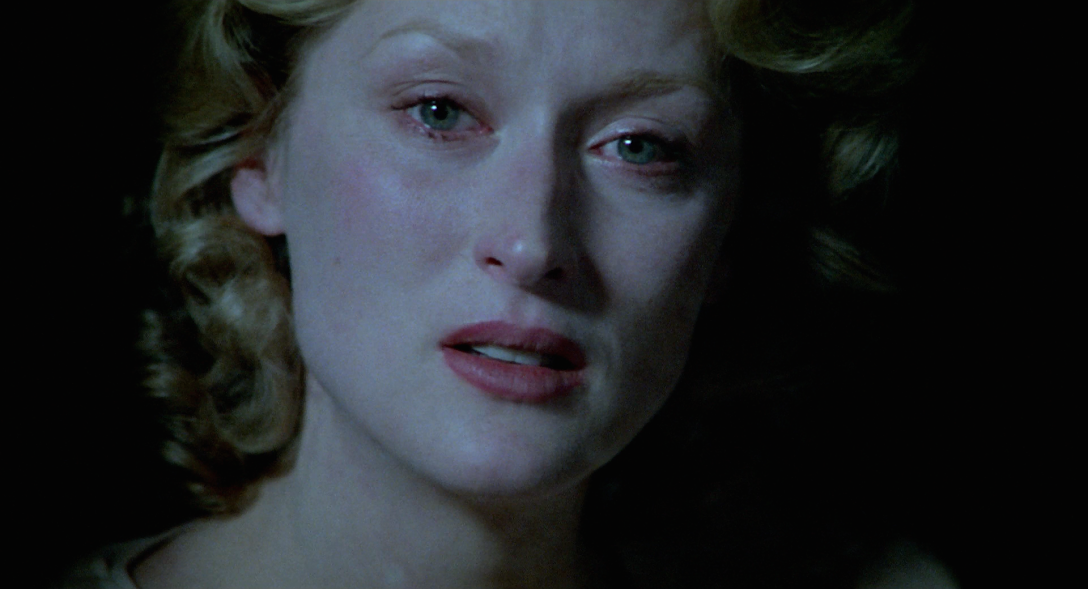
This is what made Streep’s talent not just so startling but so radical. Her emotional transparency allowed every thought and feeling to live on the surface, daring us to look away from the almost unbearable intimacy of her characterizations. This trademark skill of Streep’s is easy to overlook in the zestier and/or more backgrounded roles that comprised her early output. But it’s called upon relentlessly in Sophie’s Choice for what are easily the film’s most iconic scenes, like those confrontational, direct-to-camera testimonies about her time in the camps, in which her expressions are so delicate that they look as if they’ve been painted with watercolor on stained glass, a triumph that must also be partly attributed to ace cinematographer Nestor Almendros. Just as unforgettable is Sophie’s quarrel with that unsympathetic librarian over “Emile Dickens,” in which Streep’s sallow, tremulous appearance clues us into Sophie’s overwhelming experience as a lonely, indigent refugee in Brooklyn, a period unsurprisingly unexplored by filmmakers who seem incapable of imagining their heroine in solitude, away from the company of intrusive men.
And then, of course, there’s The Choice. Whatever your opinions of Sophie’s Choice, it’s impossible to deny that this is one of the most jolting and indelible scenes in American cinema, an undertaking made possible by the unflinching clarity of Streep’s emotional responses, which make the shock of this loss not only register but ache. The experience of watching it has somehow remained the same. The critical distance imposed between myself and the film during its first two hours utterly evaporates. Its misjudgments fall away and there is only Sophie, which is to say there is only Streep, who is at once ever-present and invisible as the scene escalates, an actress inextricable from the character and her calamitous fate. But I don’t marvel at Streep’s all-encompassing technique or feel the slightest urge to evaluate any particular choices. I just witness. And, in my mind, this scene is where the movie rightfully ends, with the blanched, open-mouthed devastation of a mother, forced to endure an unspeakable tragedy that belongs to nobody but her and her extraordinary interpreter.
Previously:
Julia, The Deer Hunter, Manhattan, The Seduction of Joe Tynan, Kramer vs. Kramer, The French Lieutenant's Woman, Still of the Night